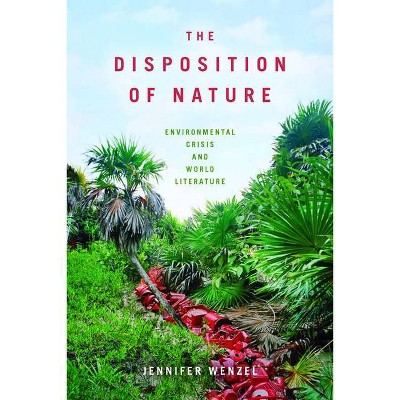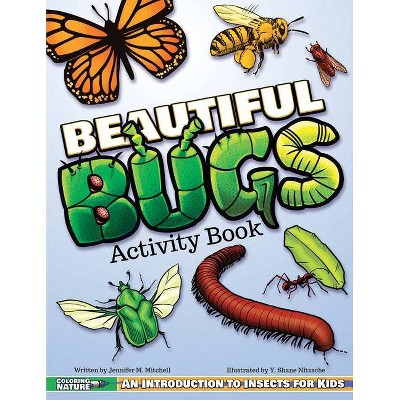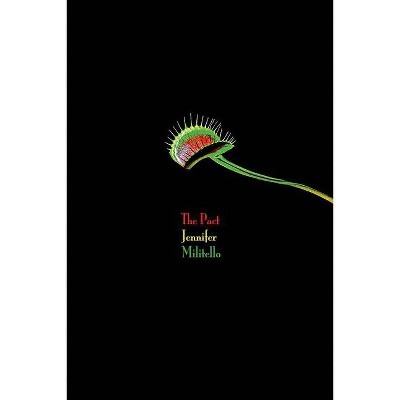The Disposition of Nature - by Jennifer Wenzel (Paperback)

Similar Products
Products of same category from the store
AllProduct info
<p/><br></br><p><b> About the Book </b></p></br></br>This book examines how literature shapes understandings of nature and can therefore be both complicit in environmental harm and part of an environmentalist practice. The book devotes particular attention to formerly colonized regions (e.g. Africa and South Asia) in order to understand the relationships among imperialism, globalization, and environmental injustice.<p/><br></br><p><b> Book Synopsis </b></p></br></br><p><b>Shortlisted, 2020 ASAP Book Prize</b> <p/>How do literature and other cultural forms shape how we imagine the planet, for better or worse? In this rich, original, and long awaited book, Jennifer Wenzel tackles the formal innovations, rhetorical appeals, and sociological imbrications of world literature that might help us confront unevenly distributed environmental crises, including global warming. <p/><i>The Disposition of Nature</i> argues that assumptions about <i>what nature is</i> are at stake in conflicts over <i>how it is inhabited or used</i>. Both environmental discourse and world literature scholarship tend to confuse parts and wholes. Working with writing and film from Africa, South Asia, and beyond, Wenzel takes a contrapuntal approach to sites and subjects dispersed across space and time. Reading for the planet, Wenzel shows, means reading from near to there: across experiential divides, between specific sites, at more than one scale. <p/>Impressive in its disciplinary breadth, Wenzel's book fuses insights from political ecology, geography, anthropology, history, and law, while drawing on active debates between postcolonial theory and world literature, as well as scholarship on the Anthropocene and the material turn. In doing so, the book shows the importance of the literary to environmental thought and practice, elaborating how a supple understanding of cultural imagination and narrative logics can foster more robust accounts of global inequality and energize movements for justice and livable futures.</p><p/><br></br><p><b> From the Back Cover </b></p></br></br><p>"<i>The Disposition of Nature</i> is a tour de force. It will set a new bar for the burgeoning field of ecological criticism, and will become a foundational text for the environmental humanities. The research is of astounding range and quality, it is written with gorgeous clarity and elegance, and its intellectual ambition leaves one breathless."--Mary Louise Pratt, New York University <p/>"A world is not <i>the </i>world. The globe is not the planet. These deceptively simple but powerful claims inform Jennifer Wenzel's impressive contribution to debates about global capitalism and energy regimes, environmental justice, and world literature. Wenzel brilliantly analyzes images and imaginations of the planet in the intellectual tradition of vernacular cosmopolitanism: constructions of the world from below rather than above, from the socioeconomic margins rather the elite. The result is a powerful affirmation of the value of postcolonial perspectives in discussions of the Anthropocene as well as a trenchant critique of the recent world literature paradigm. A must-read for anyone interested in environmental justice and its relation to literature and narrative."--Ursula K. Heise, University of California, Los Angeles <p/>How do literature and other cultural forms shape how we imagine the planet, for better or worse? In this rich, original, and long awaited book, Jennifer Wenzel tackles the formal innovations, rhetorical appeals, and sociological imbrications of world literature that might help us confront unevenly distributed environmental crises, including global warming. <p/><i>The Disposition of Nature</i> argues that assumptions about <i>what nature is</i> are at stake in conflicts over <i>how it is inhabited or used</i>. Both environmental discourse and world literature scholarship tend to confuse parts and wholes. Working with writing and film from Africa, South Asia, and beyond, and drawing on insights from political ecology, geography, anthropology, history, and law, Wenzel elaborates what it means to read for the planet: to read from near to there, across experiential divides, between specific sites, and at more than one scale. A supple understanding of cultural imagination and narrative logics, Wenzel shows, can foster more robust accounts of global inequality and energize movements for justice and livable futures. <p/><b>Jennifer Wenzel</b> is Associate Professor of English and Comparative Literature and of Middle Eastern, South Asian, and African Studies at Columbia University.</p><p/><br></br><p><b> Review Quotes </b></p></br></br><br><i>The Disposition of Nature</i> is a tour de force. It will set a new bar for the burgeoning field of ecological criticism, and will become a foundational text for the environmental humanities. The research is of astounding range and quality, it is written with gorgeous clarity and elegance, and its intellectual ambition leaves one breathless.<b>---Mary Louise Pratt, New York University, <i></i></b><br><br>A world is not <i>the </i>world. The globe is not the planet. These deceptively simple but powerful claims inform Jennifer Wenzel's impressive contribution to debates about global capitalism and energy regimes, environmental justice, and world literature. Wenzel brilliantly analyzes images and imaginations of the planet in the intellectual tradition of vernacular cosmopolitanism: constructions of the world from below rather than above, from the socioeconomic margins rather the elite. The result is a powerful affirmation of the value of postcolonial perspectives in discussions of the Anthropocene as well as a trenchant critique of the recent world literature paradigm. A must-read for anyone interested in environmental justice and its relation to literature and narrative.<b>---Ursula K. Heise, University of California, Los Angeles, <i></i></b><br><p/><br></br><p><b> About the Author </b></p></br></br><b>Jennifer Wenzel</b> is Associate Professor of English and Comparative Literature and of Middle Eastern, South Asian, and African Studies at Columbia University. She is the author of <i>Bulletproof: Afterlives of Anticolonial Prophecy in South Africa and Beyond</i> (Chicago and KwaZulu-Natal, 2009). With Imre Szeman and Patricia Yaeger, she co- edited <i>Fueling Culture: 101 Words for Energy and Environment </i>(Fordham, 2017).
Price History
Price Archive shows prices from various stores, lets you see history and find the cheapest. There is no actual sale on the website. For all support, inquiry and suggestion messagescommunication@pricearchive.us




















